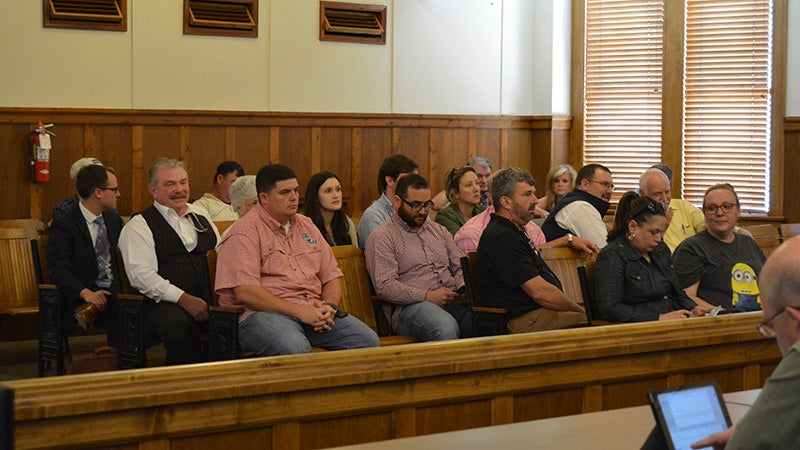Board of Supervisors uses ordinance to block addiction center
Published 7:00 am Thursday, April 19, 2018

- PUBLIC INTEREST: A large group of people turned out for Wednesday’s Board of Supervisors meeting to hear the Board’s decision on a proposed addiction clinic being established just outside of Picayune. The Board cited an existing ordinance to prevent if from opening. Photo by Mrudvi Bakshi
During Wednesday’s Pearl River County Board of Supervisors meeting, the Board addressed public concerns about the planned establishment of an addiction treatment center outside of Picayune.
Several concerned citizens showed up to the meeting that was said to act as a public hearing. Before the Board addressed the public, the meeting was moved from the Board’s chambers on Julia Street in Poplarville to the Circuit Court courtroom in the Pearl River County courthouse due to the large turnout.
Before addressing the public on the matter, the Board went into executive session to discuss the matter with Robert Thigpen, who was making renovations to the building where the center would be located. The purpose of the center would have been to provide medically assisted treatment for opioid addiction, according to previous coverage.
After returning to open session, Board Attorney Joe Montgomery read an ordinance approved in 1999 that stated, it would be unlawful to operate any halfway homes, prisons, rehabilitation or other remedial business that would help current prisoners, current or ex-drug addicts, current or ex-alcohol addicts, inmates, patients or any other similar business.
Violation of this ordinance would be a misdemeanor, and those convicted would be subject to a fine of between $250 to $1,000 and/or six months in the county jail, or both, Montgomery said. The Board decided to comply with the ordinance and prevent Thigpen from moving forward with establishing the center at the building, which was previously the Swim Hutch off of Sycamore Road.
“We represent the public in the county,” Board Vice President Hudson Holliday said.
Holliday said that since an ordinance was already in place it was the Board’s duty to enforce it. Hudson added that if Thigpen proceeded with the project, the Board would be forced to file a lawsuit.
“I hope he sees the public opposition and will have second thought about it,” Holliday said. “Bringing drug addicts to the community is not the way to clean this place up.”
Board President Sandy Kane Smith said the Board used the existing ordinance to stop the center from being established, in part due to the public outcry.
“I’m real proud of the community, they did their homework and opened my eyes on the issue,” Smith said.
Smith said opposition came from the Christian community, law enforcement officers and families dealing with addiction, he said.
Picayune native Missy Lee was among the many present during Wednesday’s meeting to oppose the center.
“I am excited after this decision,” Lee said. “If he opens it we’ll continue to fight against it.”
She said she had nothing against Thigpen but felt the center would only draw negative attention to the community and be unable to help fight addiction.
Thigpen was not at the public announcement that the Board had prevented the center’s establishment, but said via phone that the Board never spoke to him about the matter during the executive session or allowed him to speak about the benefits he felt the center could bring.
Due to the Board’s decision, Thigpen said he is now unsure of his next step.
“It totally surprised me that there were so many people against helping people that need help,” Thigpen said.
In a written statement Thigpen and his wife Sherri said that they, “and a representative from Crossroads Treatment Center were invited to attend a meeting with the Pearl River County Board of Supervisors in executive session,” Wednesday morning at 11 a.m. “We received no written notification, only a phone call. When we arrived at the meeting, we were informed that the Board of Supervisors was holding a public hearing across the street at the courthouse. We were escorted to the Board’s meeting room only to find an empty room at which time Board attorney, Joe Montgomery… spoke with us. At no time did we have the opportunity to meet with the Board of Supervisors. We received no notification of any public hearing regarding our property; only a phone call asking us to attend an executive session with the Supervisors. We were not prepared to present information at an unannounced public forum. We were also told that there was going to be a video shown during this public hearing that officials put together. We were informed that the intent of the video was to depict Crossroads Treatment Centers to the public. The content that was to be presented in this video was not provided by or authorized by Crossroads Treatment Centers.”


